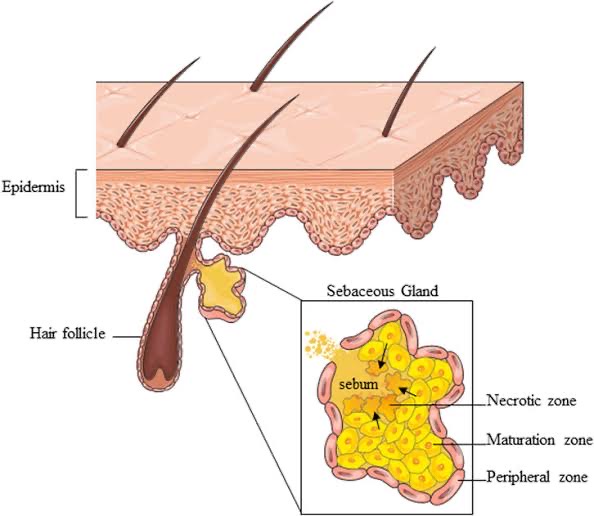Sebaceous glands, often overlooked in discussions about skin health, play a crucial role in maintaining the skin’s moisture and overall integrity. Understanding these glands can help us appreciate their contribution to our skin’s health and how their dysfunction can lead to various skin conditions.
What Are Sebaceous Glands?
Sebaceous glands are microscopic exocrine glands found in the skin. They are located in the dermis, the layer of skin beneath the epidermis, and are typically attached to hair follicles. These glands are most abundant on the face and scalp but are present throughout the body, except on the palms of the hands and soles of the feet.
Function of Sebaceous Glands

The primary function of sebaceous glands is to produce and secrete an oily substance called sebum. Sebum is a complex mixture of lipids, including triglycerides, wax esters, squalene, and free fatty acids. This secretion serves several important functions:
1. Moisturization: Sebum helps to keep the skin and hair moisturized. It creates a thin, protective layer that retains moisture and prevents the skin from becoming dry and brittle.
2. Protection: The oily layer provided by sebum acts as a barrier against external factors, such as bacteria, fungi, and other pathogens, helping to prevent infections.
3. Lubrication: Sebum facilitates the smooth passage of hair through the hair follicles, reducing friction and preventing damage.
4. Temperature Regulation: By forming a barrier on the skin’s surface, sebum helps to regulate body temperature and prevent excessive water loss through evaporation.
Regulation of Sebum Production
Sebum production is regulated by several factors, including hormones, particularly androgens like testosterone. During puberty, the increase in androgen levels stimulates the sebaceous glands to produce more sebum, which can lead to oily skin and acne. Other factors that influence sebum production include genetics, diet, and environmental conditions.
Common Disorders Associated with Sebaceous Glands
1. Acne: Acne is one of the most common skin conditions associated with sebaceous glands. It occurs when the glands produce excess sebum, which, along with dead skin cells, can clog hair follicles. This creates an environment conducive to the growth of Propionibacterium acnes bacteria, leading to inflammation, pimples, and cysts.
2. Seborrheic Dermatitis: This is a chronic inflammatory skin condition characterized by red, itchy, and flaky skin. It often affects areas with a high concentration of sebaceous glands, such as the scalp, face, and chest. The exact cause is unknown, but it is believed to be related to an overgrowth of yeast that lives on the skin.
3. Hyperplasia: Sebaceous hyperplasia is a benign condition where the sebaceous glands become enlarged and form small, yellowish bumps on the skin, particularly on the face. While not harmful, these bumps can be cosmetically concerning for some individuals.
4. Sebaceous Cysts: Also known as epidermoid or pilar cysts, these are non-cancerous lumps that form due to a blocked sebaceous gland. They are typically filled with sebum and can become inflamed or infected if not properly managed.
Maintaining Healthy Sebaceous Gland
Maintaining the health of sebaceous glands is crucial for overall skin health. Here are some tips to ensure they function optimally:
1. Cleansing: Regular and gentle cleansing can help keep pores clear of excess sebum and dead skin cells, reducing the risk of acne.
2. Balanced Diet: A diet rich in essential fatty acids, vitamins, and minerals supports healthy skin and sebum production. Foods like fish, nuts, and green leafy vegetables are beneficial.
3. Hydration: Drinking plenty of water helps to keep the skin hydrated from the inside out, supporting the sebaceous glands in maintaining the skin’s moisture balance.
4. Proper Skincare: Using non-comedogenic skincare products that do not clog pores can help maintain the balance of sebum production without causing acne or other issues.
5. Stress Management: Stress can influence hormone levels, which in turn can affect sebum production. Techniques such as meditation, exercise, and adequate sleep can help manage stress levels.
Sebaceous glands, though small and often unnoticed, play a significant role in skin health. They provide essential lubrication, protection, and moisturization to the skin and hair. Understanding their function and the conditions associated with them can help in maintaining healthy skin and preventing common skin problems. With proper care and attention, we can ensure that our sebaceous glands function optimally, contributing to overall skin health and well-being.